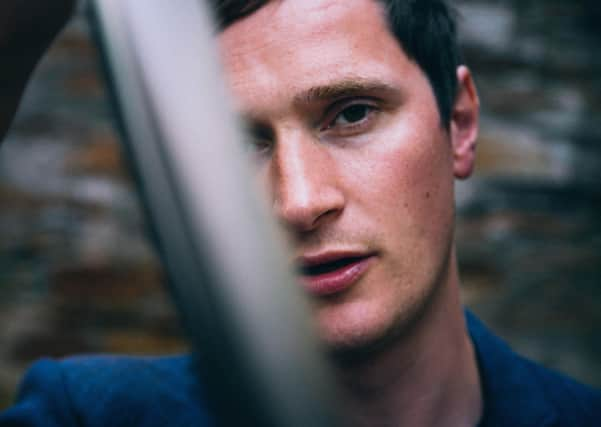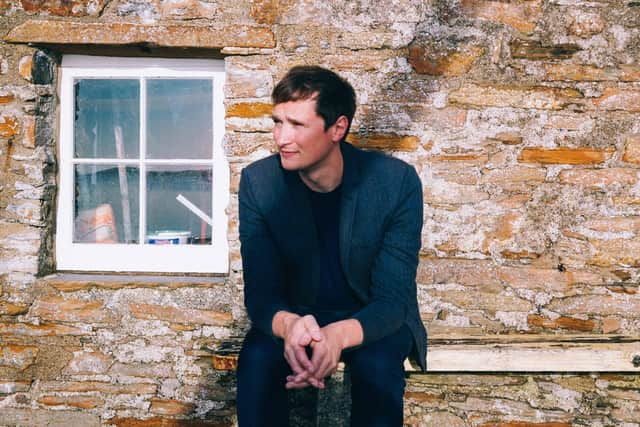Erland Cooper: ‘I hope it feels like the three albums sit together or go in a circle’


Erland Cooper is in buoyant mood when we catch up. He’s fresh from an NHS volunteering shift in London and is evidently finding the experience rewarding.
“I’ve been picking up meds and potatoes and carrots and things like that,” he says of his role as a courier. “I got the app a couple of months ago when it was introduced. It’s like this Second World War siren that goes off and then you get a call.”
Advertisement
Hide AdAdvertisement
Hide AdDriving around the capital’s streets in the early stages of lockdown was strange, he says. “I was driving by St Paul’s Cathedral and there was not a soul around, I was just picking up bits and bobs. I got pulled over by the police twice and I just showed them my pass and they said, ‘carry on’. It was remarkably eerie and interesting at the same time. It was a good way to get out and about, out of the studio, the same four walls.”
In amongst his volunteering, the 35-year-old musician and composer, formerly of The Magnetic North, has released a new album. Hether Blether is the final part of a triptych of neoclassical musical impressions on the Orkney Islands, where he was born and grew up.
While its predecessors Solan Goose and Sule Skerry explored the air and sea, this album focuses on the land. It was conceived, he says, with “a narrative about exploring where it would take me”.
“Whilst the first record is about the air and this feeling of freedom and escape and travelling somewhere else by wings, the second record is about the sea, and it’s also about safe places. This record is about land, but it’s really more about community, how people come together, why they tell stories which in turn become read. Knowing that, to explore has been a joy and that’s why this record, I think, is peppered with a little bit more spoken word, a little bit more of the harmonics of the voice, rather than the earlier records. But I hope it feels like the three albums sit together or go in a circle.
Advertisement
Hide AdAdvertisement
Hide Ad“That’s what I explored the most. Really it was the sound of the soil but also the folk working it. Not just early history, but going all the way back 5,000 years to Neolithic history and Picts and Vikings.


“When you go to Orkney you can really feel a sense of imagining it not having changed that much if you look in the right places. Why is Stromness, where I grew up, called Hamnavoe, which means sheltered bay which would’ve been of Viking origin? You can just imagine these explorers arriving in this sheltered bay and thinking, ‘let’s call it that’.”
Another joy, he says, was the process of “reamping sounds” found “in strange places” on his travels around the Scottish archipelago. “It’s one step further in field recording,” explains. “I would create a sound here in my studio and take that sound to Orkney and perhaps go inside a cairn, which is a Neolithic burial chamber, which is designed actually to carry the voice at a whisper for ceremonial purposes. So I would reamplify that sound in that new space then record that sound again.
“The way a room reflects sound and resonates at different frequencies is remarkable in every space you go to, but it felt like I was able to capture the resonant sound of the soil in the land itself and taking it back. But of course that’s for me. It’s like field recordings at the next level.”
Advertisement
Hide AdAdvertisement
Hide AdExploring the islands via these three records has been a fascinating voyage into his Orcadian heritage. “And it comes out in different ways,” he says. “You experience memory in two ways: one, you put it back out and you remember one thing and that thing that you remember almost becomes a myth in itself, they way you remembered it, why you remember it, and then as an adult you open the same pages of the same book and you read it differently and you see it differently and it all unfolds in your brain differently.”
Cooper grew up steeped in the folklore of the Orkney Islands. “My parents’ sitting room was this curious room full of books and records and ornithological ornaments, the bill of a curlew or perhaps the skull of a seal found on the shore. It was one part curious and another part brilliant room.
“It’s a room full of stories by those much more authoritative in the field, like George Mackay Brown or Margaret Tait, who are Orcadian poets and filmmakers, and lots of my mum’s music books, which was encouraged in school. Mum encouraged us to learn the fiddle. The songs would often have folk tales linked to them, they were all hand in hand. Even if you were to just leaf through the pages you would find one about the city of sea birds at Marwick Bay then the next one would be about trowes (trolls) and selkies (seal folk). It was a real treasure trove and remains so.”
His parents’ sitting room features in one of the short films that Alex Kozobolis made with Cooper to accompany the albums. “We made nine films, did over 200 or 300 pictures together on this collaboration in five or six trips in three years, that was a really key part of it as well.”
Advertisement
Hide AdAdvertisement
Hide AdDuring lockdown Cooper was also commissioned to write a piece of music for Chris Hawkins’ show on BBC 6 Music, to mark Mental Health Awareness Week. “We asked listeners to send in recordings of things that they were noticing during this time of change when noise pollution wasn’t an issue, when you could really hear things a lot more clearly. I think this idea that there’s more birds and more animals isn’t quite right; they’re just reclaiming the spaces. You could hear the sound of a blackbird singing at 4am for half a mile in the city whereas you couldn’t hear that before.
“The recordings that came in were brilliant, some from Leeds, some from Orkney, some from Loch Ness, all sorts of places, and from vacuum cleaners to birdsong, babies’ hiccups to cats purring. It was a joy. I leafed through hundreds and in the end I think everybody maybe thought I was going to do some sort of ambient mash-up, but it kind of wrote itself into a score. It felt important to be one part remembrance and one part celebration of good people doing good things. I wanted it to feel quite British and celebratory.”
The piece also features “one of the earliest recordings ever made” of Crimean War nurse Florence Nightingale alongside Paul Weller. “That was done in 1890 and it was a real reflection of memory. She would’ve been 200 a few weeks ago. Her voice was all crackly and I tidied it up a bit but kept the magic of that crackling. It was a bit inaudible at times so I thought ‘who’s got a great British voice that we all recognise?’ Of course it’s Paul. I’d co-written a few songs on his last album so I just messaged him and he’s such a creative person that he just replied immediately, recorded it in his back garden and within minutes it was back in the studio. He didn’t know what the context was, he didn’t speak it at the same time as Florence but I just dropped it in and to me it fitted like birdsong.”
Heather Blether is out now. Erland Cooper is due to play at Leeds College of Music on September 25. For details, visit www.lcm.ac.uk
Comment Guidelines
National World encourages reader discussion on our stories. User feedback, insights and back-and-forth exchanges add a rich layer of context to reporting. Please review our Community Guidelines before commenting.